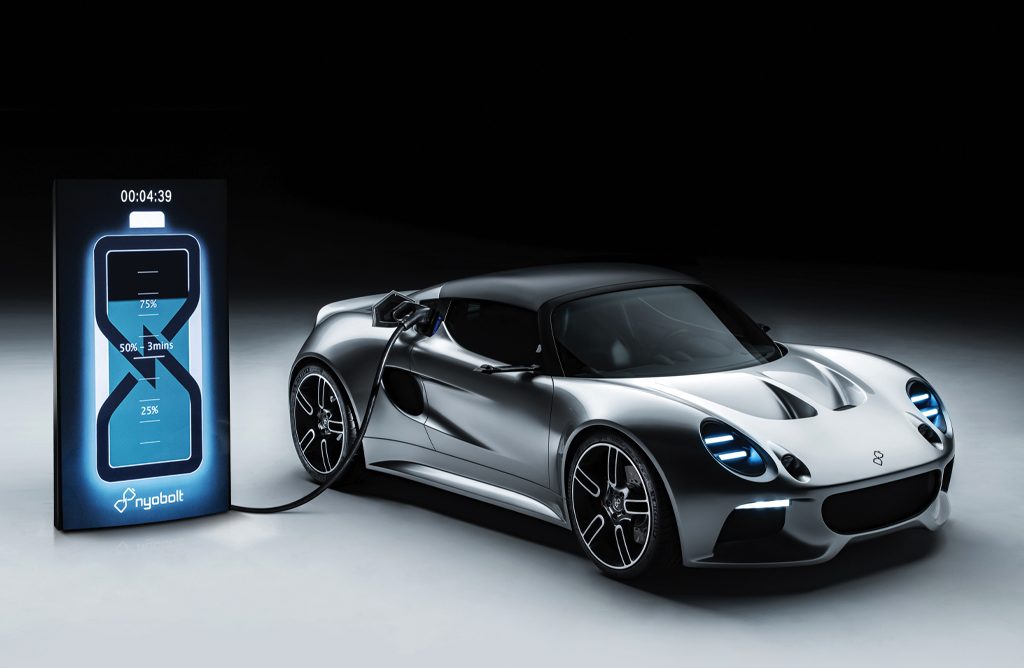EV Insights: Nyobolt’s rapid recharge
A new partnership in the EV world is planning to tear up the rulebook when it comes to vehicle charging times. By John Kendall.
 A number of companies have been pursuing faster charging batteries for some time and, if battery technology company Nyobolt is successful, we may not have to wait too much longer. The key to faster charging has been to reform either the cathode or the anode of the battery cell – the negative and positive terminals respectively. What has eluded researchers up to now has been to find a material that proves to be stable under repeated charging.
A number of companies have been pursuing faster charging batteries for some time and, if battery technology company Nyobolt is successful, we may not have to wait too much longer. The key to faster charging has been to reform either the cathode or the anode of the battery cell – the negative and positive terminals respectively. What has eluded researchers up to now has been to find a material that proves to be stable under repeated charging.
Nyobolt believes that it should be possible to rapid charge a battery in around six minutes, roughly the time it would take you to fill a petrol or diesel tank and pay for it. The company worked on the F1 KERS (Kinetic Energy Recovery System) project and has a considerable degree of experience with battery technologies. Nyobolt recently announced a joint venture with design agency Callum to test the new battery in a prototype electric car designed by Julian Thomson, based on the Lotus Elise, which he designed in the 1990s.
“Nyobolt believes that it should be possible to rapid charge a battery in around six minutes, roughly the time it would take you to fill a petrol or diesel tank and pay for it”
The background to the technology
Nyobolt’s thinking is simple. Lithium-ion batteries are both heavy and expensive. EV batteries have grown in size in recent years to overcome range anxiety, but this has added to both the weight and the cost. As an example, several van manufacturers are now offering a range of battery sizes, with fleets having to decide whether they need to prioritise range or payload. If a battery can be charged rapidly, range will matter less, while fitting a smaller battery could offer cheaper vehicles.
The batteries use similar chemistry to the current lithium-ion type cells but are equipped with a modified anode (positive terminal) as this is more important for rapid charging.
“One of the advantages of the cells is that they don’t get very hot, so we can get away with a lot less heat management than you would think,” says Dr Steve Hutchins, Nyobolt’s vice president of operations and engineering. The company has tested cells to over 2,000 charging cycles and found that they still retain over 80% capacity at very high charging rates.
“We haven’t really faced any issues at all,” says Dr Hutchins. “Obviously there’s a lot of engineering that’s gone into the anode to make it last as long as it does, but we don’t have any stability issues there, it’s not limiting the life of the battery.
“We started with a 12V battery in a robotic vacuum cleaner,” he explains. “We were able to show that charging in three minutes and then vacuuming for 30 minutes. Previously it spent 15% of its time vacuum cleaning and 85% charging and we switched that around, so we were getting something like 90% productivity out of it. So, we thought, could we do the same thing with a vehicle?”
Dr Hutchins says that you can either go for maximum energy or maximum power, but can’t get both at the same time.
“So, if we go for maximum charge rate, we won’t match the energy of current batteries,” he reasons. “If we match the energy of today’s batteries, yes that’s possible, we wouldn’t be able to get such a fast charge time.”
Fast charging for all
Like current EV batteries, the Nyobolt design will take either AC or DC charging. It has been designed to charge even on the highest-powered chargers on the network which are currently rated at around 360kW. A further advantage is that the Nyobolt design can accept full power charging all the way through the charge. Currently, most vehicles will only charge to 80% charge, or less before the power drops off leaving the final 20% of charge at a much slower rate.
Nyobolt staged a demonstration, charging a battery housed in a cool cabinet, but cooled only by a cold plate under the battery. A temperature sensor displayed the battery temperature throughout the six-minute charge and reached a peak of 42°C, much cooler than a current lithium battery, most of which are equipped with cooling systems, while some rapid chargers are also equipped with cooled charging cables to conduct the heat away, making them heavier and more difficult to connect to the vehicle.
SO… If Nyobolt’s testing is successful, it could be a game-changer for EVs, making them potentially lighter and cheaper. For vans, it could deliver more payload and keep pricing competitive. It could also put a question mark over the development of hydrogen fuel cell vehicles, which offer the advantage of rapid refuelling compared with current EVs.












